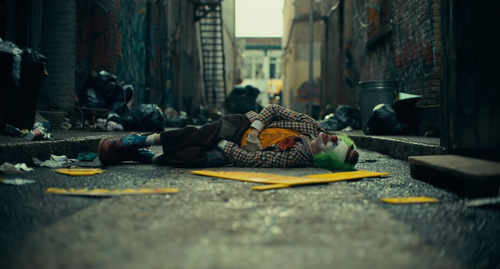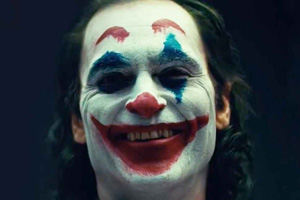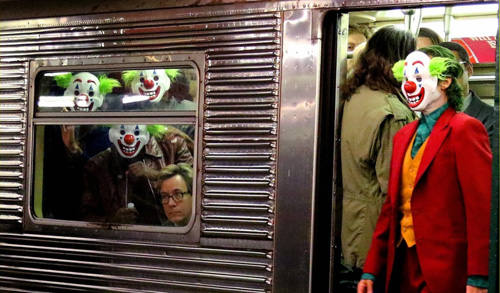
Your complimentary articles
You’ve read one of your four complimentary articles for this month.
You can read four articles free per month. To have complete access to the thousands of philosophy articles on this site, please
Films
Joker
Ștefan Bolea meditates on madness at the movies.
Most of us possess a sense of reality, but what if our senses deceive us? Would I still know what was real if, for instance, I had a microscopic brain tumor that made me hallucinate that the people around me were devils, or that a beautiful sunny day was a dark nightmare? What if I then felt the urge to start shooting people?
Joker, a psychological thriller directed and co-written by Todd Phillips, is a meditation on this disassociative sort of madness. It emphasizes the philosophical problem of the ‘liquid’ divide between perception and reality: if my perception is biased, then my reality transforms as well. A second, connected, problem of madness, is the dissolution of the distinction between inside and outside. I can project my inner being onto the world, changing its color and tone. If I can’t tell that I’m doing this then I’ll live in a labyrinthine inferno, a prison of my own projections. No one can reach out to somebody with this kind of insanity. No one really exists for them, and after a while their own broken mirror reflects no one. The subject devours the world, also disintegrating in the process.
Joaquin Phoenix portrays Arthur Fleck, a failing stand-up comedian with a psychological disorder that causes him to laugh at inappropriate moments. The film provides a backstory for the character of the Joker in the Batman stories. Under the pressure of successive disasters and injustices, Fleck descends into madness and goes on a killing spree. In the process, though, he adopts the persona of Joker and becomes the symbol of a revolution against privilege in Gotham City, and a hero to rioters who fail to grasp the depth of his disorders. Madness is notoriously difficult to perform, because, on one hand, the actor must keep his emotions in check while acting as if they are out of balance, and, on the other, his exaggerations must be credible, otherwise the movie becomes a melodrama or caricature. But watch, for instance, arguably the most disturbing scene of the movie, in which Arthur smothers his mother with a pillow as he delivers the crucial line: “I used to think that my life was a tragedy, but now I realize it’s a comedy.” Arthur’s tone is neutral, as if his actions are completely severed from any emotion. The scene is a cold description of gestures with no reference to sentiment. The apathy of the murder is chilling. The brilliance of Phoenix’s performance of madness makes me think of other great deranged villains from past decades: Jack Torrance (Jack Nicholson) from The Shining; Bobby Peru (Willem Dafoe) from Wild at Heart; John Doe (Kevin Spacey) from Se7en.

Don’t kick a clown when he’s down.
Joker images © Warner Bros. Pictures 2019
Closely linked to the central theme of madness in Joker is the idea of the ineffectiveness of psychotherapy. “You never listen,” complains Arthur to his therapist, “All I have are negative thoughts.” Dialogue is seen as fake, and because access to the awareness of others is blocked, one enters the realm of solipsism, where pain is incommunicable. The other person may be falling apart, yet I cannot see through his mask. So Joker is also a meditation on ‘ontological insecurity’, as R.D. Laing put it, and on a sort of existential paranoia. If I lack empathy, the other may seem to me like a robot, a computer program, or a ghost. I may even doubt the existence of the other person. I may even come to doubt my own existence: the other never sees me, therefore I fail to see myself, therefore I fail to exist. Invisibility is a socio-political problem: many may feel that they don’t have a place, that they are worthless, that they don’t mean nothing, that their lives make no ‘cents’, as Arthur writes in his journal.
Which brings us to the idea of the ‘damnation of the poor’. A society for which money is god always ultimately equates failure with death. There are many ways in which the poor are put to death by such a society, and one is the denial of healthcare. Arthur’s access to therapy and medication becomes hindered on account of welfare cuts, precipitating his insane behaviour. I might even infer that the motif of rats, which occurs a few times in the movie, is a symbol of the great mass of the poor, which Karl Marx called the lumpenproletariat, resistant to the systemic extermination machine.

Two religious ideas come to mind. First, I think of the Hindu principle of tat tvam asi (‘thou art that’), which states that we should try to recognize the same essence in the other, since we are essentially the other. Failure to recognise ourselves in the other means that ‘man is wolf to man’; that exploitation never ends; that ‘the boot stamping on a human face’ (to quote Orwell’s 1984) forever remains the symbol of our never-ending civil war. This lack of empathy is another motif throughout the movie, and it leads to mass destruction. Second, I think of the Christian idea that greatest are those who serve; “they and not the strong being pointed out as having the first place in God’s regard” (in John Stuart Mill’s words). So contempt towards the lowly in the movie is not merely a symptom of fascistic indifference but of satanic arrogance. Like Hamlet’s play-within-a-play, the Joker scene where the wealthy are seen amusing themselves while watching Chaplin’s Modern Times, a film about the hardship of life during the Great Depression, discloses the sadistic sense of superiority of the ruling class, who observe the drama of the disadvantaged from the heights of their contempt. When the most advanced societies treat their most disadvantaged members as ‘rats’, one may say that pessimism becomes a valid interpretation of life and that optimism is wicked, as Arthur Schopenhauer argued. In the movie, many respond to Joker as people respond to Schopenhauer or to the nihilist philosopher Emil Cioran: they are so sick of being lied to that accepting even an inconvenient or toxic truth is better than believing the lie.
We come to a central problem of humor. We are trained to laugh only when it is appropriate. “We enjoy ourselves and have fun the way they enjoy themselves” is how Martin Heidegger puts it in Being and Time. Joker has his own particular humor, and laughs when things aren’t funny, so harassing the dictatorship of conformism. Generally, he can be seen as an educator of the sense of humor. One might distinguish between fake laughter – the appropriate laughter of the ‘they’ – and Joker’s super-fake laughter that becomes authentic because it is his own original expression, uninfluenced by social imperatives. His vision of life as a comedy which is darker than a tragedy reminds us of the absurdist playwright Eugène Ionesco’s reflection regarding the hopelessness of the comic. When we enjoy watching a performance of Ionesco’s Exit the King, we are laughing at the tragic aspect of existence – we laugh at our lives and our deaths. Joker’s vision of life as comedy is also connected to his mental illness, and so raises the question from Umberto Eco’s The Name of the Rose: is laughing demonic or divine? According to some theologians, the devil – the first parodist – is simia Dei (‘God’s ape’). People are sadder than they declare, sadder even than they think they are. “I’ve never been happy,” declares Fleck ironically, upon explaining that his childhood nickname was ‘Happy’.

I wouldn’t get on that train if I were you.
Finally, one of Joker’s central ideas is reminiscent of Fight Club or Mr Robot: a schizoid character sparks the flame of insurrection. One question we might ask here is, do I have to fight myself, or the world? In other words, should I attempt to master myself, as the Stoics urged, or should I attempt to conquer the world? And is the loss of myself acceptable if I gain the world in return (cf Matthew 16:26)? When he becomes Joker, Arthur becomes the worst possible version of himself; but he gains the world, or at least the acceptance of some part of it, turning into a symbol of the revolution.
If I’m fighting evil, I cannot be good, because then I would surely lose. Sadly, I must become more evil than evil. Paraphrasing Nietzsche, we might say that whoever fights monsters will surely become a monster.
© Dr Ștefan Bolea 2020
Dr Ștefan Bolea earned 2 PhDs, in Philosophy and in Literature, from the University of Cluj-Napoca, Romania. He is also the editor-in-chief of the magazine EgoPHobia (www.egophobia.ro) and the editor of Apostrof.









